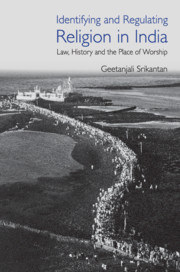Book contents
- Frontmatter
- Contents
- Acknowledgements
- Introduction
- 1 Secularisation and Theologisation: The Making of ‘Hindu Law’ and British Colonialism
- 2 The Role of Legal Hermeneutics as Secularisation in the Formation of Anglo-Muhammadan Law
- 3 Influences and Confluences: The Theological Foundations of Western Property Law and the Place of Worship in India
- 4 Identifying ‘Doctrine’: Tracing Theologisation in Legal Narratives of the Place of Worship in India
- 5 Rethinking Definitions: Hinduism as Religion in the Indian Supreme Court
- Conclusion
- Glossary
- List of Cases
- Bibliography
- Index
4 - Identifying ‘Doctrine’: Tracing Theologisation in Legal Narratives of the Place of Worship in India
Published online by Cambridge University Press: 30 April 2020
- Frontmatter
- Contents
- Acknowledgements
- Introduction
- 1 Secularisation and Theologisation: The Making of ‘Hindu Law’ and British Colonialism
- 2 The Role of Legal Hermeneutics as Secularisation in the Formation of Anglo-Muhammadan Law
- 3 Influences and Confluences: The Theological Foundations of Western Property Law and the Place of Worship in India
- 4 Identifying ‘Doctrine’: Tracing Theologisation in Legal Narratives of the Place of Worship in India
- 5 Rethinking Definitions: Hinduism as Religion in the Indian Supreme Court
- Conclusion
- Glossary
- List of Cases
- Bibliography
- Index
Summary
Introduction: The Colonial Legal System in the Framework of English Legal Culture
Colonial legal processes in India have been subject to multiple genealogies. The codification of Hindu law was a product of secular legal reasoning influenced by theological narrative and manifesting itself in historically situated events. The production of Islamic law was driven by the internalisation of legal concepts and ideas borrowed from Western legal thought. Thus, the making of religion as a legal category necessarily involves the importation of secular legal frameworks.
How do these secular legal frameworks manifest themselves in actual legal practice? Current legal frameworks around the place of worship carry traces of theological narrative. The determination of a place of worship is also based on the criteria of charity, which further determines what public worship is. Charity as a concept had tremendous influence on legal institutions such as the trust, which was used to regulate places of worship. The institutionalisation of the trust also involved an interface with the structure of legal systems, particularly the bifurcation of English law into common law and equity.
The role of the transplantation of these dual systems of law came in for active discussion in the context of how the Indian legal system should be structured is interesting in this respect. On comparing the two systems of law, Erskine Perry, a judge of the Bombay High Court, has no doubt as to which one he thinks is superior:
Now it is evident that of these two conflicting systems which co-exist with a view to the same object-the elicitation of truth-both cannot be correct, and I think that a very little examination will shew that the Equity system is far more consonant to common sense, and the requirements of justice, and that it has a marked superiority over its rival in excluding chicanery, technicalities, and the triumphs of form over substance…. The rules of the Common Law on the subject have on the other hand been framed without reference to principle, and have been subjected to no searching examination, but are the accidental growth of centuries, and (certain symptoms of their little foundation in reason) are modified by innumerable exceptions. (Perry 1850: 12–13)
- Type
- Chapter
- Information
- Identifying and Regulating Religion in IndiaLaw, History and the Place of Worship, pp. 121 - 175Publisher: Cambridge University PressPrint publication year: 2020

